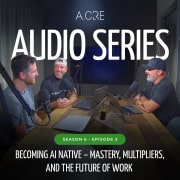Insights from Spencer’s Cornell Real Estate Distinguished Speaker Series Interview
Recently, our own Spencer Burton was invited to participate in the Cornell Real Estate Distinguished Speaker Series, a platform renowned for hosting leading voices in the real estate industry. During this prestigious event, Spencer had the opportunity to share his invaluable insights, particularly focusing on data-driven real estate investment. This blog post aims to shed light on how innovation in real estate, particularly through data analytics and technology, is revolutionizing real estate investment, as discussed in Spencer’s insightful interview.
In this post, we’ll delve into the key aspects of data-driven real estate investment as shared by Spencer during his visit to Cornell. He offers a deep dive into the evolution of real estate investing in today’s market landscape, underscoring the increasing significance of data-driven strategies. Join us as we explore his expertise on navigating the challenges and opportunities in today’s dynamic real estate sector, with a special focus on data-driven real estate investment.
What is the Cornell Real Estate Distinguished Speaker Series?
The Cornell Real Estate Distinguished Speaker Series is a hallmark of the university’s commitment to bridging the gap between academic learning and real-world practice in the real estate sector. This series brings together industry leaders, innovators, and pioneers to share their insights and experiences with students, faculty, and the broader Cornell community.
The significance of this series lies in its ability to expose attendees to the forefront of real estate thought leadership, providing a platform for discussion on emerging trends, challenges, and opportunities in the industry. By hosting speakers like Spencer Burton, the series not only enriches the educational experience but also strengthens the connection between current market dynamics and academic study.
What is the Cornell Baker Program in Real Estate?
The Cornell Baker Program in Real Estate is a premier educational platform that offers an immersive, comprehensive learning experience in the field of real estate. Positioned within the Cornell SC Johnson College of Business, the program is designed to equip students with a deep understanding of real estate’s multifaceted nature, blending finance, development, and management perspectives. The curriculum is structured to provide a balance of theoretical knowledge and practical skills, ensuring that graduates are well-prepared to meet the demands of the global real estate industry.
A key feature of the Baker Program is its emphasis on experiential learning, including internships, case studies, and field trips, which are instrumental in providing students with real-world exposure. Additionally, the program’s connection with industry leaders and experts, as seen in initiatives like the Distinguished Speaker Series, significantly enhances the educational journey. Graduates of the Baker Program are known for their readiness to tackle the complexities of the real estate sector, armed with a robust foundation in both the principles of real estate and the innovative practices shaping the industry’s future.
Key Takeaways from Spencer Burton’s Interview: Embracing Innovation in Real Estate
Below, you’ll find the YouTube video of the interview, where you can hear Spencer’s thoughts on how innovation in real estate is revolutionizing real estate investment.
Question 1: Why is a data-driven real estate investment approach superior?
Spencer emphasizes that in a market with flat or rising rates, where there is a constant headwind to value creation, innovation becomes crucial. A data-driven approach, especially with advancements in generative AI, offers a significant edge. The quality and relevance of AI models are directly tied to the underlying data. Firms with large, proprietary data sets for training their models will have a competitive advantage.
Question 2: What was the impetus for you, both personally and as a firm, to adopt your unique data-driven approach?
Personally, Spencer has always found fulfillment in innovation, constantly questioning why things are done a certain way and believing in the possibility of improvement. Professionally, his firm Stablewood, led by senior partner Glenn Lowenstein, has been committed to challenging the status quo and embracing next-level strategies, like data-driven real estate and mixed-use development concepts.
Question 3: What do you miss most about your time as a Baker student?
Spencer misses the energy and depth of real estate-focused conversations at Cornell. He values the rich, meaningful discussions about the future of real estate, which he finds lacking in casual professional conversations about general topics like sports or food.
Question 4: What skills should students learn that aren’t necessarily taught in the classroom?
Spencer advises students to focus on skills related to big data, like data analysis, aggregation, cleaning, and structuring. He also highlights the emerging importance of generative AI and suggests students stay abreast of developments in large language and image diffusion models, understanding how these technologies will change investment strategies.
Question 5: For students who want to develop their own data-driven investment strategies, what resources do you recommend?
He suggests exploring publicly available data sets not typically used by real estate professionals and creatively applying them to real estate. He also encourages a manual approach to data collection, like creating a comprehensive data set of a specific area, which can provide unique insights not readily available online.
Question 6: On a scale of 1 to 10, where 10 is Bloomberg, what is CoStar’s ceiling in terms of breadth and accuracy of data?
Spencer acknowledges CoStar’s role in providing essential market data but sees it as just the first step in a more in-depth analysis necessary for making investment decisions. He implies that while CoStar is useful, it has limitations, and the most valuable data in real estate often lies in proprietary information held by private firms.
Question 7: For students trying to figure out what real estate niche they want to specialize in, what types of roles or firms should they target?
For those uncertain about their specialization, Spencer recommends starting with a large firm with a broad mandate to gain a generalist perspective. For those with a clear interest, he advises immediately specializing in a firm that aligns with their interests. He notes the importance of specializing early to accelerate career progression, despite the slow start associated with a generalist approach.
Conclusion
We’ve delved into the world of data-driven real estate investing through the insightful lens of Spencer Burton. His candid responses to key questions offer a profound understanding of why innovation in real estate, with data-driven approaches, is paramount in today’s real estate landscape.
Spencer’s perspective serves as a beacon for those navigating the dynamic real estate industry. Whether you’re a student, a seasoned professional, or someone simply curious about the evolving dynamics of real estate investment, his insights offer valuable guidance.
Frequently Asked Questions about Data-Driven Real Estate Investment
Why is data-driven investment considered superior in real estate?
Spencer explains that “in a market with flat or rising rates…innovation becomes crucial.” He notes that a data-driven approach—particularly using generative AI—can offer a significant edge. The strength of AI models is tied to their data, giving firms with large, proprietary data sets a competitive advantage.
What motivated Spencer and Stablewood to adopt a data-driven approach?
Spencer says he has “always found fulfillment in innovation,” constantly questioning processes and seeking improvement. Professionally, Stablewood, led by Glenn Lowenstein, is “committed to challenging the status quo” with data-driven and mixed-use strategies.
What big data skills should students focus on?
Spencer highlights the importance of “data analysis, aggregation, cleaning, and structuring.” He also urges students to explore generative AI and understand large language and image diffusion models, as these will influence future investment strategies.
How can students build their own data-driven strategies?
Spencer recommends using “publicly available data sets not typically used by real estate professionals” and manually collecting data for a specific area to gain unique insights unavailable online.
What are CoStar’s limitations in real estate data?
While Spencer acknowledges CoStar’s usefulness, he describes it as “just the first step” in analysis. He notes that “the most valuable data often lies in proprietary information held by private firms.”
What types of real estate firms should students target based on their interests?
Spencer advises undecided students to begin with large firms offering a broad view. For those with clear interests, he suggests “immediately specializing in a firm that aligns with their interests” to speed up career progression.
What does Spencer miss about being a student in the Baker Program?
He misses “the energy and depth of real estate-focused conversations” at Cornell, noting that such discussions are rare in the casual professional world.









